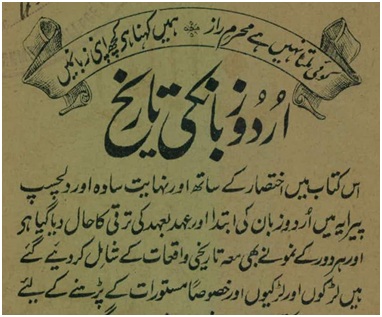


- Urdu is an Indo-Aryan language which is a comparatively younger member of the great fraternity of Indian languages.
- It has rightly been said that languages are not born; they evolve over the years.
- Linguists and literary historians are not of one opinion and have different viewpoints as to how and where the process of evolution of the Urdu language began but there seems to be a broad agreement that it began taking shape around 10th century in areas surrounding Delhi and was the result of the admixture of ShauraseniApabhransh, Khariboli and BrijBhasha with Persian, Arabic and Turkish words.
- In the earlier period. The language was also referred to as Hindi, Hindvi and Rekhta before it finally came to be called by the name Urdu around 18th century.
- As Urdu was evolving, it was looked down upon by the then ruling elite for writing and literature and was perceived as common people's language as opposed to the court language, Persian.
- Urdu shares with Hindi a similarity in phonology and grammar. Urdu and Hindi sounds are the same except for minor variations.
|
However, the Urdu words had started making their way into the sayings and poetic works of:
|
|
THE NATIONAL COUNCIL FOR PROMOTION OF URDU LANGUAGE (NCPUL)
|
ORIGIN
|
PRESENT STATUS OF URDU
|
- All the historical references indicate that origin of Urdu had taken place in Punjab state of India.
- The great poet Ameer Khusro, in his book ‘Ghurrat-ul- Kamal’ had written that Masood Lahori a renowned poet born in Lahore in 11th century had composed poetry in Hindvi (Urdu) which is also called Dehlavi. This shows that Urdu was very much originated from Punjab as Lahore was the part of greater Punjab only before partition.
- Even if it has derived some root words from Persian and Arabic languages then they were changed into Urdu language in India.
- Before it is called Urdu, it was familiar with other names including Hindustani, Hindavi, Dehlavi and Rekhta.
- The subject, object, auxiliary, verb, grammar, tenses of Urdu are very much Indian and like the Hindi language.
PATRONAGE
- It is said to have developed and flourished in Delhi along with part of Haryana state and some states in South where it was developed in the form of ‘Dakhni (Deccani) language’.
- Historians said that it had developed and flourished in Delhi during the period of ‘Delhi Sultanate’ from 12th to 16th century and then during the period of ‘Mughal Empire’ in Delhi from 16th century to 19th century.
- It flourished as several court poets used this language in their great poetry and writings and then it was also developed in Deccan states.
DECCAN INDIA
- When Delhi Sultanate and then Mughal Empire spread its wings towards the Deccan, Urdu speaking people of Delhi spread the language in South.
- There it got developed and flourished in Dakhan (Deccan) states mainly in Karnataka, nowadays Telangana, part of Kerala and Tamil Nadu and Mahar
- The language derived even local words of the local languages of those states and developed it as a ‘Dakhni’ language which was a bit distinctive of Urdu language in North.
- It was during the reign of Delhi Sultanate emperor Muhammad –bin-Tughlaq who had decided to move his capital from Delhi to Daulatabad or Devagiri or Deogiri( a present-day Aurangabad) in 1327 in Maharashtra.
- With the migration of Delhi’s people, the several Urdu speaking people of Delhi spread its usage in Maharashtra for seven years till the capital of Delhi Sultanate was not reversed to Delhi in 1334.
Related Articles



